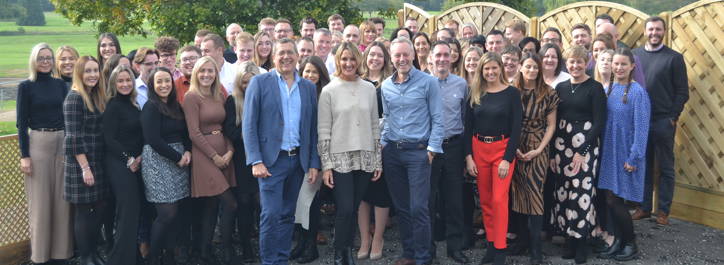Take Pride in your recruitment
 June is Pride month – 30 days dedicated to celebrating LGBTQ+ communities around the world. So why not take the opportunity to make sure your recruitment process is as fair and non-discriminatory as it can possibly be.
June is Pride month – 30 days dedicated to celebrating LGBTQ+ communities around the world. So why not take the opportunity to make sure your recruitment process is as fair and non-discriminatory as it can possibly be.
Most employers now recognise the advantages of having a diverse workforce. Recruiting people from different backgrounds across all levels gives businesses access to perspectives and ideas they wouldn’t otherwise have – in fact, research shows that companies with employees from a wide range of backgrounds perform better than those with less diverse workforces. But sadly, bias and unconscious sexism, racism and ageism are still a problem in many hiring processes. And employers may not be doing everything they can to make sure their recruitment policies help them reach candidates from all walks of life.
What counts as discrimination in recruitment?
The Equality Act 2010 made it illegal to reject any candidate based on ‘protected characteristics'. These are:
- their sexual orientation
- their age
- whether they’re married or in a civil partnership
- if they have a disability
- if they’re pregnant
- their race, ethnicity or place of birth
- their religion and beliefs
- whether they’ve had gender reassignment
- their gender.
Unconscious bias in action
Did you know that the language you use in a job advert could be indirectly discriminatory? We’ve put together some tips and advice to help you make sure your recruitment processes are fair and all-inclusive.
1. Make sure your job adverts appeal to everyone
When you’re writing a job advert or job description, focus on the skills and experience you’re looking for. Avoid using language that could stop anyone from applying.
It’s illegal to use gender-specific terms like ‘barmaid’ or ‘salesman’ in your advert. There are also other words that can subconsciously put people from certain backgrounds off from applying for a job. For example, studies show that some words might be seen as masculine – e.g. ‘ambitious’ and ‘competitive’ – and could stop women from applying for a position. On the flip side, words like ‘supportive’ and ‘collaborative’ tend to appeal to women more than men. It’s also important not to use age-related language – so don’t ask for a certain number of years of experience. Words like ‘youthful’ or ‘mature’ are also problematic as these might be seen as ageist.
Unfortunately, this is all a bit of a grey area – there isn’t a list of banned words or phrases. So you’ll have to use your discretion to decide if the wording you’re using might put certain people off from applying for your position. There are some useful proofing tools available online which can help you identify biased language in job ads or descriptions. The important thing is to always remember to focus on the skills someone needs to do the job.
Think about where you advertise as well. Only posting your adverts in one type of publication, or even just having them online, could cause indirect discrimination (because only certain types of people will see them). Always using the same channels for recruitment is likely to deliver you the same types of candidates, so consider looking elsewhere to advertise positions. If you don’t have one already, an employee referral scheme (where you offer your existing employees incentives to recommend new people for positions that come up) can be a good way to reach people from different backgrounds.
2. Have a standard interview process
Asking every candidate the same set of pre-defined questions will help you focus on finding out about the skills they’ll bring to the position. You’ll also give all applicants the same chance to tell you why they’re the best person for your job. You can always follow your standard questions up with more specific ones about someone’s skills as you go through them. You could also have an interview scorecard to grade each interviewee’s answers on the same scale.
You might also want to include a skills-based test if that works for the type of job you’re recruiting for. This is a really good way to make sure you get the candidate with the abilities you need. And it makes it easy to compare candidates.
Whatever you decide, make sure that any questions you ask are only about someone’s ability to do the job. You can’t ask anything about the protected characteristics we mentioned above – in fact, you’ll be breaking the law if you do. Here are some examples of questions that you might not realise you can’t ask (this is by no means a definitive list):
- When did you graduate? This is a roundabout way of asking someone how old they are, which you’re not allowed to do.
- How old are your children? You can’t discriminate against someone because they have children. You can ask them if they have any commitments that might have an impact on them being able to do the job or work specific hours though.
- Have you got a criminal record? Applicants don’t have to tell you about any spent criminal convictions. You also can’t refuse to give someone a job if you find out they have a spent conviction unless it directly relates to the role you’re recruiting for (e.g. if someone with a fraud conviction applies for a financial role).
- What country were you born in? This doesn’t have anything to do with someone’s ability to do a job, so you should never ask it. You can ask them if they’re authorised to work in the UK though.
3. Train your people on unconscious bias
Unconscious bias is when we make assumptions about someone’s suitability for a position based on their age, gender or background, even though we might not realise we’re doing it. This can lead to employers missing out on the best candidates. The good news is that there are lots of strategies for reducing unconscious bias, including:
- asking different people to assess applications: get as many people as is practically possible to review CVs, including those who’ll be at the same level as the new hire. This can really help you get a wide range of perspectives, and weed out any bias. Our Executive Director Lynn Walters says: ‘If you do one thing differently, it should be to review how diverse your shortlist is the next time you hire. If it lacks diversity, raise this (appropriately) with your recruiter. Doing this in the right way can make a real difference.’
- removing identifying information from CVs: taking out candidates’ names and other identifying factors like their age, gender, years of experience and education can force hiring managers to only focus on qualifications and skills (there are various bits of software available to do this)
- running anti-bias training: by its very nature, unconscious bias is something we don’t realise we’re doing. So training can benefit people at all levels of an organisation. But it’ll be especially useful for managers, and those on the frontline of recruiting.
At Pure, we run unconscious bias training for all our recruitment consultants, as part of their induction programmes.
Need some help?
Whatever positions you’re recruiting for, we have the reach and expertise to put together a diverse shortlist of candidates and help you avoid using any direct or indirect discrimination in your recruitment processes. Get in touch to find out how we can help.
Explore our Women’s Leadership programme
While it’s only one part of building an inclusive workplace, the business case for gender diversity at all levels is clear. As part of this, we run our Women’s Leadership Programme, which supports ambitious women who are clear about their next career move but would like some help making the next step up. It’s just one of the ways we’re working to inspire organisations to create rewarding work environments that remove any barriers to progression, where everyone is able to work in a way that makes them feel productive and engaged.



